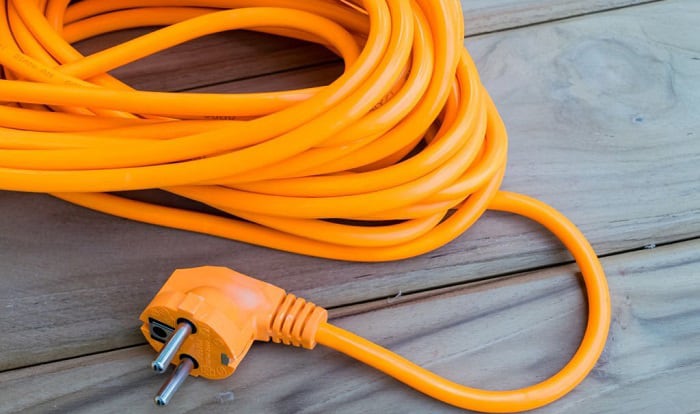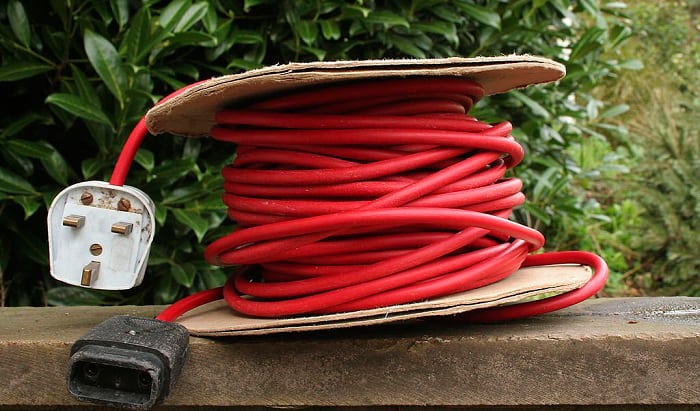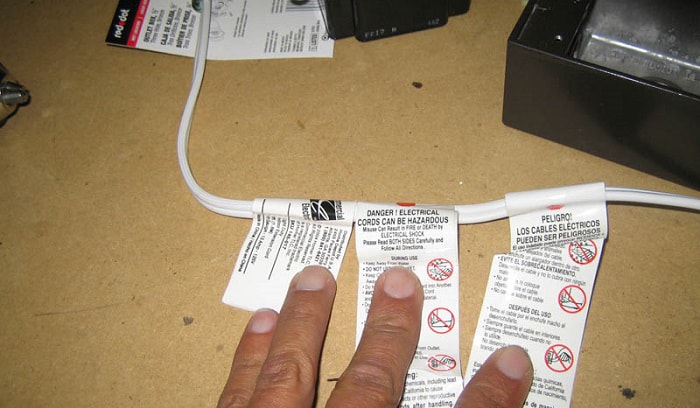Extension cords are handy for powering up electrical equipment that is far away from an electric socket. They are also useful when you need more outlets to plug into. However, it would be advisable to have the proper wire sizing for each application.
If you ask what gauge extension cord do I need, the answer may vary depending on your practical needs. Aside from that, it would also be helpful to consider the length of the cord for supporting your devices.
Table of Contents
What Size of Extension Cord Do I Need?
An extension cord aims to extend the energy supply from different outlets. It is helpful to power up any electrical devices in an area with no power source.
However, regarding safety, the cord’s thickness and length must be taken into consideration. This way, you can avoid problems like wire overheating, which can lead to circuit breaker tripping or a fire.
Here’s what to know about these two significant factors when determining the right extension cord size for your application.
1. Thickness of Wire
In simple words, the thicker the cords, the more power they can deliver. As a result, you must use an extension cord of sufficient thickness to avoid electrical issues.
Generally, the broadness of the wire is measured in AWG (American Wire Gauge), and the lower the number, the bigger the wire is. This value indicates how much electricity a cord can hold without being damaged.
As a result, it is preferable to use an extension cable with a higher rating than the device rating.
- To determine whether a cord is appropriate for your gadgets, compare its AWG with that of your appliance. The extension’s AWG should be one grade lower.
- However, if there is no such identification on your equipment, you should obtain the amperage of your appliance.
Most devices have a label on their back with this information. If there are only watts and voltage, you need to calculate the amp by dividing the watts by its voltage ratings.
For example, a 1200-watt device on a 110-volt electrical supply will require 10.9 amps in total. This means that your extension cord should be capable of carrying more than or at least 10.9 amps.
The same procedure applies if you need to use an extension cord for TV, heaters, etc.
2. Length of Wire
The cord length should also be considered when using an extension cord for more than 25 feet.
This is required to prevent voltage drops when electricity travels a longer distance.
Moreover, when the cable is too long, it can cause your circuit to draw more power, causing your breaker to trip.
In these cases, you may refer to the extension cord gauge guide below for the recommended and proper wire sizing based on the application length.
| 25 – 50 Feet | 100 Feet | 150 Feet | |
| 16 Gauge | 1-13 Amps | 1-10 Amps | — |
| 14 Gauge | 14-15 Amps | 11-13 Amps | 1-7 Amps |
| 12 Gauge | 16-20 Amps | 14-15 Amps | 8-10 Amps |
| 10 Gauge | 16-20 Amps | 16-20 Amps | 11-15 Amps |
As you notice, I did not include the 18 gauge extension cord in the list since it is not regularly used. This size is only good for powering very light devices such as lamps, clocks with a rating of 5-7 amps over 25 feet.
- Pro tip: For Christmas lights outside your house that are over 25 feet from outlets, it is good to use a 14 gauge extension cord and a GFCI device. This way, you can freely add additional lighting and protect it from the rain.
How to Tell Gauge of Extension Cord?
There are two simple methods for determining the extension cord gauge: Check the box label or the cord cover.
1. Check the Box Label
If your extension is new and has never been used, it will likely still contain the original box label. You can find there the cord size, together with the features of the cord.
2. Check the Cord
If you look at the body of the cord, it will probably have the size imprinted. Just check the entire length of the extension cable.
Conclusion
Using the proper size extension cable may help you avoid electrical problems such as frequent cord heating and circuit breaker tripping. At the same time, it will provide a suitable conveyer for your devices’ current needs.
Is this article helpful in answering your query about what gauge extension cord do I need? Is there anything else you’d like to learn about extension cords? You can leave your thoughts in the comments section below; we will gladly address it in future posts.

I am Edwin Jones, in charge of designing content for Galvinpower. I aspire to use my experiences in marketing to create reliable and necessary information to help our readers. It has been fun to work with Andrew and apply his incredible knowledge to our content.



